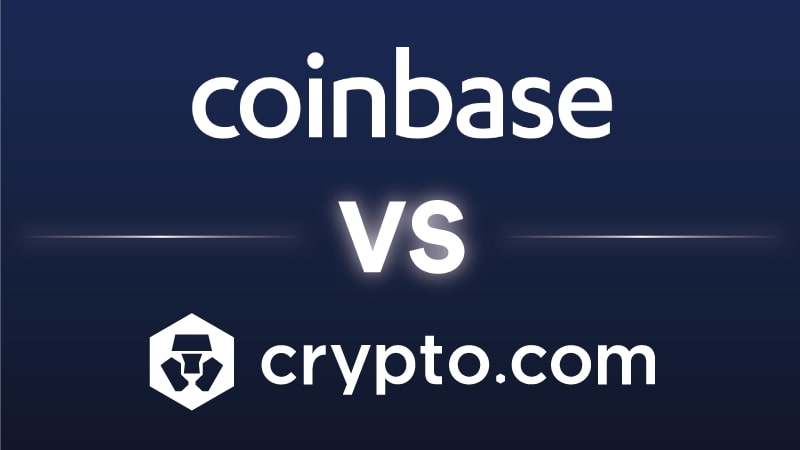Coinbase and Crypto.com are both popular international cryptocurrency exchanges with a wide range of products. In this Crypto.com vs. Coinbase review, we’ll take a look at how the two exchanges compare in terms of fees, security, available cryptocurrencies, and more. Find out which exchange might be best for you in our detailed Crypto.com vs. Coinbase rundown.
Crypto.com vs. Coinbase : Fees
There are three main fees to be aware of when using cryptocurrency apps and exchanges: deposit, trading, and withdrawal. Costs can vary depending on the payment method, trading amount, location, and cryptocurrency.
Neither Crypto.com nor Coinbase charge fees to deposit money via a bank transfer, but both charge for debit card payments. On most exchanges, you’ll find it’s free to deposit cryptocurrencies but costs to transfer a fiat currency (traditional money) from your bank account.
Unfortunately, Coinbase is not very transparent about its crypto trading fees — it says they are calculated when you place your order but doesn’t publish its maker/taker fee as other sites do.
Let’s say you were to buy $200 worth of Bitcoin on Coinbase with a debit card, you’d pay a Coinbase fee of 3.99% to use the card and a spread of around 0.5%. The spread may change when you make the trade. Fees are lower and more transparent if you use Coinbase Pro.
On Crypto.com, you’d pay 2.99% to use a debit card and a maker/taker trading fee of 0.4%. This fee is reduced for higher trading volume customers or those who stake the Crypto.com coin (CRO). Crypto.com waives the debit/credit card fee for new customers in the first 30 days.
As with its trading fees, Coinbase only discloses the withdrawal fee when you make the transaction. It’s free to move money to a Coinbase wallet, but you’ll have to pay a variable fee to move your crypto asset to a different external crypto wallet. In contrast, Crypto.com publishes its withdrawal fees for each cryptocurrency, though it’s free to move assets to the Crypto.com wallet.
Overall the fees on Crypto.com are lower. But Coinbase does offer additional deposit options, such as a transfer from PayPal.
Crypto.com vs. Coinbase : Cryptos available
Coinbase has expanded its cryptocurrency selection this year, but it doesn’t yet have as many coins as Crypto.com. You’ll find all the major cryptocurrencies like Bitcoin (BTC), Ethereum (ETH), Cardano (ADA), Solana (SOL) on either platform. Each one also trades major stablecoins like USD Coin (USDC) and Tether (USDT).
Crypto.com offers U.S. customers around 140 cryptocurrencies and Coinbase has around 90. Both exchanges trade most of the top 30 cryptos by market cap, though Coinbase doesn’t trade Binance Coin (BNB), Avalanche (AVAX), or VeChain (VET). There are also a couple of coins that aren’t available in every U.S. state.
Crypto.com vs. Coinbase : Wallets
Coinbase and Crypto.com both have highly-rated decentralized wallets. These are non-custodial hot wallets (connected to the internet) that are separate from the custodial wallets on the exchanges themselves. You control your keys and your account security. Keys are like a bank PIN, and many crypto enthusiasts argue it’s important to control your private key, as it reduces the risk of hacking or having your account frozen.
Both wallets support a wide variety of coins, including all tokens built on the Ethereum network. However, Coinbase’s crypto selection could be broader — it doesn’t yet support fairly big coins like Cardano, Algorand (ALGO), or EOS (EOS). Crypto.com also makes it easier to stake coins (earn interest by tying them up) and to import an existing wallet.
Crypto.com’s DeFi wallet lets some users swap coins on decentralized exchanges through the app; however, this service is not available to U.S. customers. Coinbase’s offer is stronger here. Its U.S. wallet users can access its decentralized trading service but only for Ethereum-based coins.
Crypto.com vs. Coinbase : Security
Both exchanges follow industry best practices in terms of security. However, there are some important differences. For example, Crypto.com’s insurance only covers assets held in cold storage. However, it says it does not store user funds in hot wallets.
Conclusion
Coinbase and Crypto.com are both excellent cryptocurrency exchanges with services that will suit different types of customers. While Coinbase charges higher fees, its wealth of information and extremely easy-to-use trading platform may work well for first-time crypto investors. It also accepts payments from PayPal, and you can earn crypto by watching educational videos. Plus, the Coinbase Visa debit card pays crypto rewards on purchases without any additional requirements.
Crypto.com provides more ways to earn staking rewards, a wider range of coins, and lower fees. However, it has fewer educational resources, and its interface is not as intuitive as it could be — especially for those who prefer to manage their crypto assets through a web browser. The Crypto.com mobile app — which is not available in New York — has a lot more functionality than the web exchange. Plus, users need to commit large amounts of CRO to unlock reduced fees and Visa card rewards, which they may not want to do.
As with many things in life, there’s no one-size-fits-all cryptocurrency exchange. It’s important to think about what services you need. A person who wants to buy and hold Bitcoin will have different requirements from an active crypto trader who wants to exchange new tokens each day.


